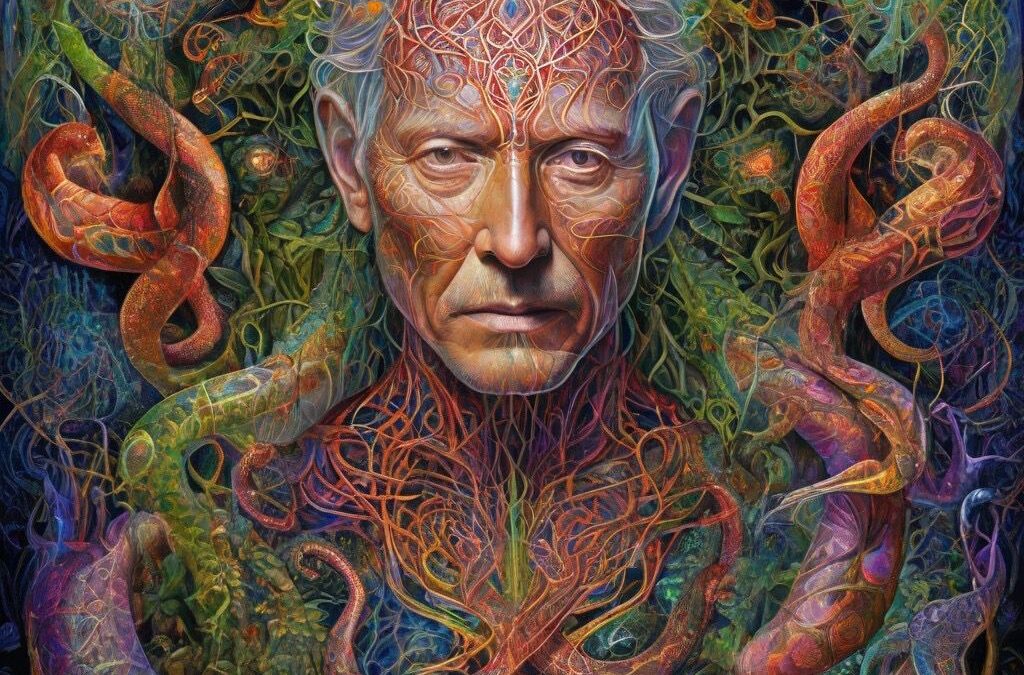*Ayahuasca and the Jungian Archetypes: A Journey to the Inner Self*
The ancient brew known as Ayahuasca, traditionally used by indigenous tribes of the Amazon in Peru, has piqued the interest of modern psychology for its profound effects on consciousness and the psyche. Originating from Peru, this entheogenic concoction is revered for its healing properties, offering transformative experiences that harmonize the mind, body, and spirit. In the context of psychotherapy, Ayahuasca has been recognized for its potential to facilitate deep psychological transformation, often aligning with the principles of Carl Jung’s analytical psychology, particularly his concept of archetypes.
*The Therapeutic Voyage: Ayahuasca’s Influence on the Psyche*
Ayahuasca is made by combining the Banisteriopsis caapi vine and the leaves of the Psychotria viridis plant, both of which are native to the Amazon rainforest. This blend produces a powerful psychoactive effect due to the presence of N,N-Dimethyltryptamine (DMT) in the leaves and monoamine oxidase inhibitors (MAOIs) in the vine, which allow the compound to be orally active. The effects of Ayahuasca can be profound, often leading to experiences of ego dissolution, time distortion, and encounters with symbolic imagery and visions that can be interpreted through a psychological lens.
The use of Ayahuasca as a therapeutic tool has been studied within the framework of psychology due to its capacity to precipitate psychological change. It appears to facilitate a direct confrontation with the subconscious, where individuals can experience vivid manifestations of their inner world, often in the form of Jung’s archetypes.
*Carl Jung and the Collective Unconscious*
Carl Jung, a Swiss psychiatrist and psychoanalyst, introduced the concept of the collective unconscious, a part of the psyche that harbors the experiences and knowledge of the entire human species. Within this collective unconscious reside archetypes, which are innate, universal prototypes for ideas and may manifest in the world through behaviors, symbols, and myths.
Jung identified several primary archetypes, including the Self, the Shadow, the Anima and Animus, and the Persona. The Self is the archetype of wholeness and the regulating center of the psyche; the Shadow contains the hidden or unconscious aspects of the self, often those parts that the conscious mind rejects or ignores; the Anima and Animus represent the feminine and masculine aspects within us, respectively; and the Persona is the mask we present to the world, shaped by societal expectations and norms.
*Ayahuasca and the Unveiling of Archetypes*
Participants in Ayahuasca ceremonies often report encountering symbolic figures and motifs that can be closely associated with Jungian archetypes. These experiences can be intense and revealing, as Ayahuasca seems to act as a key that unlocks the deeper layers of the psyche.
1. *The Shadow and Ayahuasca*: The process of facing one’s Shadow can be both challenging and liberating. Ayahuasca often brings forth the darker, unacknowledged parts of the psyche, forcing an individual to confront fears, past traumas, and repressed emotions. This confrontation can be the first step towards acknowledging and integrating these aspects, which is essential in the journey towards psychological wholeness.
2. *The Anima/Animus and Ayahuasca*: Ayahuasca experiences can also bring forth the Anima or Animus, the inner feminine or masculine. This encounter can lead to a better understanding of one’s relationship with the opposite gender and a harmonization of the masculine and feminine aspects within oneself, which is critical for emotional and psychological balance.
3. *The Self and Ayahuasca*: The ultimate goal of Jungian psychology is the realization of the Self, the archetype of wholeness and integration. Ayahuasca experiences often culminate in profound feelings of unity and interconnectedness, suggesting a momentary realization of the Self. This can be a transformative experience leading to personal growth and an enhanced sense of purpose.
*Transformation and Therapy: Ayahuasca’s Psychological Implications*
Ayahuasca’s impact on the psyche does not end with the archetypal visions; it often initiates a process of transformation. By facilitating the release of trapped emotions and catalyzing changes in perception, Ayahuasca can help individuals break free from destructive patterns and self-limiting beliefs. The brew has been used to treat various psychological conditions, including depression, anxiety, and post-traumatic stress disorder (PTSD), with promising results.
The therapeutic potential of Ayahuasca is twofold: it allows for a profound introspective journey that can bring insight and clarity, and it seems to foster a biochemical environment in the brain that supports neuroplasticity and emotional release. This dual action makes Ayahuasca a unique adjunct to therapy, one that could potentially reshape the landscape of psychological healing.
*Ethical Considerations and the Future of Ayahuasca Ceremonies in Peru*
As the global interest in Ayahuasca ceremonies grows, so does the importance of addressing ethical considerations surrounding its use in Peru. The traditional practices of Ayahuasca ceremonies are deeply rooted in indigenous cultures, and the preservation of these traditions while ensuring ethical standards is crucial for the future of Ayahuasca in Peru.
Respect for indigenous knowledge and cultural appropriation are significant ethical concerns. It’s essential to honor the origins of Ayahuasca and the wisdom of indigenous communities who have safeguarded this sacred plant medicine for generations. Collaborative partnerships with indigenous healers and communities can help maintain the integrity of Ayahuasca ceremonies and ensure that they are conducted in a culturally respectful manner.
Furthermore, ensuring the safety and well-being of participants is paramount. Proper screening, informed consent, and skilled facilitators are essential components of ethical Ayahuasca ceremonies. The future of Ayahuasca in Peru relies on upholding ethical standards that prioritize the healing, spiritual growth, and respect for indigenous traditions within a framework of responsible and sustainable practices.
Ayahuasca Peru
Ayahuasca Iquitos
Best Ayahuasca Retreat Peru
Flower of life Ayahuasca center Peru
Best Shaman course Peru
We cordially invite you to immerse yourself in the serene beauty of the Peruvian Amazon with an exclusive retreat experience at our Flower of life Ayahuasca Retreat Center nestled within the heart of this majestic jungle. Our Ayahuasca retreat center in Peru offers a sanctuary of tranquility and an opportunity for self-discovery amidst the lush, vibrant canvas of one of the Earth’s most awe-inspiring ecosystems.
www.floweroflifeperu.com

